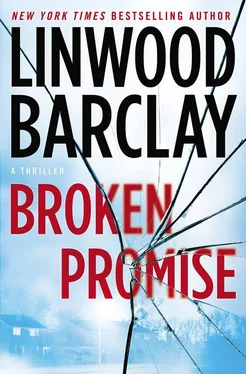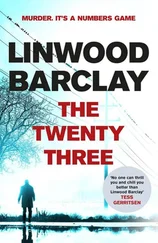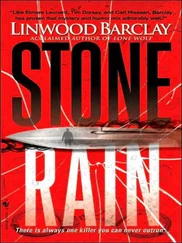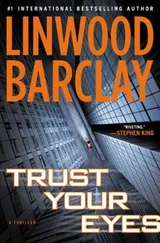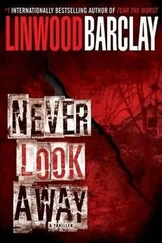Sturgess thought, Shit . The police had already been here? Did they already have Sarita?
“I was sent back here to talk to you again,” Sturgess said, improvising. “We don’t think you were very forthcoming with our other officer.”
“Well, I don’t know anything about that,” she said. “I want you to get out of my house. I want to watch my shows.”
Sturgess looked at the high-tech chair in its elevated position. On the small table next to it, a remote, a book of crossword puzzles, an open box of chocolates, a Danielle Steel novel. That was her whole world there, a command center, sitting in front of the television.
Sturgess walked over there, found where the TV cord led to a power bar, and yanked it out. The TV went black.
“Hey!” Mrs. Stemple said.
The doctor knelt down, started fiddling with the cables.
“What are you doing?” she asked.
“I’m going to take your DVR, your cables, all this shit,” he said.
“What the hell for?”
“Because you won’t cooperate,” he said.
“She went to the bus station.”
He stopped. “What?”
“Sarita. She took a taxi to the bus station. She’s going to New York. Now turn my TV back on.”
“How long ago was this?”
The woman shrugged. “Ten minutes? I don’t know. Hook that back up.”
Sturgess plugged the TV back in, and the screen came to life. He stood up and said, “There you go.”
“Now get out,” Mrs. Stemple said.
“Let me help you into your chair,” he said.
“My chair helps me get into my chair,” she said, and positioned herself in front of it. She settled in, grabbed the remote, and powered the chair back down.
“I’ll let myself out,” Sturgess said.
“Whatever,” the woman said.
He exited the apartment, but hesitated before getting out his phone to ask Gaynor to come down the street to pick him up. He stood outside Mrs. Stemple’s door, thinking.
Sooner or later, after Kemper was reported missing, someone was going to come back here and interview Mrs. Stemple.
And maybe she’d mention that officer who came to see her, the one who unplugged her TV.
And the police would realize that someone else had been here to see her. Not a cop. Asking about Sarita Gomez.
Who, by that time, might be as hard to find as Marshall Kemper.
He hadn’t given the woman his name, but would she be able to recognize him? If it ever came to that? If the police put enough of this together to place him in a lineup?
Sturgess felt a pounding in his chest. His mouth was dry.
Giving Kemper that fatal injection hadn’t been an easy thing to do. But it had been necessary. There were times when you had to do things that were beyond your normal experience.
It was possible that there were other things he was going to have to do that were necessary.
But the doctor wanted a second opinion.
He got out his phone, entered a number, waited for the pickup.
“Hey,” Sturgess said.
The doctor explained the situation. That Kemper was dead. That he had a lead on Sarita Gomez. But this old lady presented a possible loose end.
He was thinking one of the oversize pillows he’d seen in the bedroom would do the trick. Wouldn’t leave a needle mark. Would anyone really consider an old woman who’d stopped breathing all that suspicious?
“So, what do you think?” Dr. Jack Sturgess asked.
“Dear God,” Agnes Pickens said. “Do what you have to do.”
Agnes set her phone down on the kitchen island.
“Who was that?” Marla asked. She was sitting on the other side, dipping a spoon tentatively into the bowl of tomato soup her mother had just prepared for her.
“Just the hospital,” Agnes said. “Even with all that’s going on, they won’t leave me alone.” She looked out the window, holding her gaze as though staring at something.
They heard Gill coming down the stairs. He slipped an arm around his daughter, gave her a kiss on the cheek, and took the stool beside her.
“Got any more of that soup?” he asked his wife.
Agnes said nothing.
“Agnes?”
She stopped looking out the window, faced him. “What?”
“Is there any more soup?”
“Hang on,” she said, and reached for another bowl in the cupboard.
“I put your bag in your old room,” Gill said to Marla. “I think you’ll be staying with us for a while. Don’t you think, Agnes?”
“Hmm? Yes, of course. Even... even when the police let you go back into your house, you should stay with us. For as long as you like.”
“Are you okay, Mom?”
“Yes, I’m fine.”
“You just seemed a little weird there for a second.”
“I told you, I’m fine.”
Marla said, “You know, I don’t have to go home anyway. I can do my work anywhere. As long as I have a computer. Dad, could I borrow your laptop? Mine’s still in the house.”
“Sure, I don’t see why—”
“I don’t know about that,” Agnes snapped. Suddenly alert, as though she’d just woken up. “Natalie told me how that detective reacted to what you were doing for a living. He was not impressed. You need to find something else to do.”
“But, Mom, I—”
“No, you listen to me. Going on the Internet and making up reviews — lying — about companies you’ve never had anything to do with, that makes you look bad. Don’t you understand that?”
Marla’s face fell. “I was really good at it. And I like writing.”
“That’s not writing ,” Agnes said. “Writing is a short story, or a novel, or poems. If you want to write, write that kind of thing. But you need to make a living some other way.”
“Jesus, Agnes,” Gill said. “You don’t think she’s been through enough in the last couple of days? You really think this is the time for career counseling?”
“She was the one who brought it up,” Agnes said. “I didn’t. All I’m saying is, when you’re feeling better, and you want to get back to work, you need to direct your talents in another direction. You can do that. I know you can. You have lots of talent, lots of natural ability.”
“What kind of talents do I have?” Marla asked. “I don’t really know how to do anything.”
“That’s not true,” her father said. “You’re good at lots of things.”
“Like what?”
“Well, let’s start with the writing. There’s lot of other ways you could do that without making up Internet reviews. Like maybe advertising? And think of all the companies that need people to write reports for them. And newspapers. You could—”
“Newspapers are dying, Dad. Look what happened to David.”
“You’re right, you’re right, but—”
The cell phone tucked into the pocket of his sports jacket started to ring. He reached for the phone, saw who it was, accepted the call.
“Hey, Martin, how are you. I’m sorry I haven’t gotten back to you. I’ve been dealing with some issues on the home front and I’m not going to be able to look at your proposal anytime soon. Yeah, sorry about that. Take care.”
Gill ended the call, set the phone onto the countertop, and made a show of pushing it away from him. It slid across the granite and bumped into Agnes’s phone, an identical model, nudging it like a curling stone.
“They’re a curse, those things,” he said. “We think they’re these great gadgets but we can never get away from everyone who wants us.”
“You could turn it off,” Agnes said, ladling soup into a bowl.
“I know, I know; I’m guilty. I could turn it off, but I don’t, because I’m afraid I’ll miss something. I could say the same thing to you, you know. You’ve got a phone practically glued to your palm.”
Читать дальше
